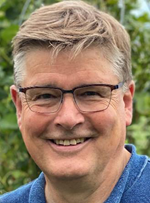
Cai Grau
Radiation oncologist and professor
Aarhus University Hospital
Aarhus Denmark
PDF Version
What have been the highlights of your career?
There have been many highlights. The establishment of the Danish Center for Particle Therapy and building the collaborative clinical trials portfolio for proton therapy with the Danish Multidisciplinary Cancer Groups are recent highlights of which I am proud. Securing European Union funding for the first European multicentre randomised trial in proton therapy (PROTECT) is another.
What do you think are the next challenges for radiation oncologists (or radiation physicists, radiobiologists, radiotherapists (RTTs), brachytherapists)?
The future for radiation oncology overall looks bright. Our profession’s role in the multidisciplinary management of cancer is undisputed and growing, as we continue to develop novel technologies for safe and effective curative treatments. Compared with other modalities, radiation therapy also continues to be inexpensive, but many of our new developments require high initial investments, and high-level evidence is needed to justify the investment. It is a prerequisite for broad access to new state-of-the-art radiotherapy treatments that we seriously engage and collaborate in the conduct of the necessary clinical trials.
What does this award mean to you?
The Breur Award is the highest honour one can receive as an ESTRO member, so obtaining this recognition from my European colleagues makes me very proud.
What has been your involvement within ESTRO?
I have been involved in ESTRO activities all my professional career: most recently as co-chair of the European Particle Therapy Network with Damien Weber and Dietmar Georg. Before this, I had the pleasure of leading the health economics in radiation oncology (HERO) project with Yolande Lievens. This was an important project that could also qualify as one of the highlights of my career. I have also been an ESTRO board member and a teacher in the ESTRO school.
What started your interest in science?
My scientific career started during medical school when I was introduced to Jens Overgaard and began work in his vibrant experimental radiotherapy environment in Aarhus. Now, 40 years later, I still enjoy the creative interaction with biologists, physicists, RTTs and clinicians in the research setting.
What are you proudest of in your career?
In addition to the establishment of the Danish Center for Particle Therapy, I am very proud of Danish radiotherapy in general. We came from a very sad situation at the beginning of this century, when we had outdated equipment and long waiting lists, but over the last 15 to 20 years we have built an infrastructure that delivers state-of-the-art radiotherapy to all Danish patients, and we enjoy strong national collaboration. We have national clinical trials for most indications, and a very broad portfolio of research activities in a well-established national collaborative network. I am proud to have been part of this evolution.
What do you do in your spare time?
I spend time with my great family; with five young grandchildren, there is always something to do. I always have small projects as I renovate our house or summer house. Hiking and bike tours are also on the list.
When do you think you will retire, and what would you like to do then?
I have no plans to retire, but when I eventually do, I hope to have more time for my family and friends, and perhaps also to take up old hobbies and sports, including golf.